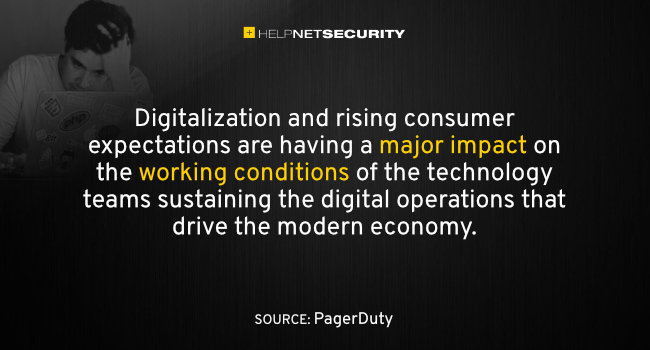Burnout and attrition impact tech teams sustaining modern digital systems
Digitalization and rising consumer expectations are having a major impact on the working conditions of the technology teams sustaining the digital operations that drive the modern economy, and burnout and attrition are on the rise, according to PagerDuty. Technical employees are more likely to leave certain kinds of teams based on after-hours expectations and inconsistent workloads.

Modern digital systems are complex and always-on, but as customers require more reliable systems, demands on technical teams increase, including after-hours and overnight responses to issues. These teams are made up of DevOps, ITOps, and customer service representatives managing complex systems, and multiple stakeholders, with the success of the business resting on their shoulders.
The data indicates that attrition and burnout are a cause for concern following two years of heavy-duty enterprise transformation.
- Across all industries, 54% of responders are being interrupted outside of normal working hours.
- 42% are working more hours in 2021 than in 2020, while only 6% reported working fewer. The earlier findings indicated that employees were already working 2+ hours more in 2020 than they did in 2019, so there’s a significant increase in hours worked over the two-year period.
- Travel and hospitality saw the most monthly incidents.
- Teams in the retail industry experienced the most disruption.
- Retail digitisation and the increasing uncertainty of supply chain disruptions in 2021 has changed the retail landscape significantly from where it was in 2019.
- The smallest organizations (measured by revenue) are being hit the hardest with Financial Services employees saw the most off-hours interruptions with customer demands and system complexity creating a very high-stress environment.
- Less than 5% of respondents had zero after-hour alerts. More than 60% reported responding to off-hours alerts once per week or more.
- Respondents noted being given fewer breaks between on-call shifts.
- Industries experiencing the highest number of team disruptions out of hours:
- Retail: 62%
- Financial Services: 59%
- Telecoms: 58%
- Travel & Hospitality: 51%
- Media & Entertainment: 48%
- Software & Tech: 48%
“Those reporting their teams had seen turnover in 2021 also worked more hours. This cycle can easily continue; when employees feel burned out and leave, remaining employees often work more hours to compensate for the attrition; this in turn can cause the same burnout of those remaining, triggering further leavers, all contributing to a loss of knowledge and expertise. Recovering from this cycle can be a major, long-term challenge,” said Jill Brennan, VP EMEA at PagerDuty.
“Respondents reported they were given less time for breaks between shifts plus increased job responsibilities. Teams that had experienced turnover in 2021 were also more likely to see increased critical incidents. This implies that organizations must expect more alerts and interruptions impacting their business as the cycle continues. Our data shows that overall, critical incidents have increased 6% in 2021 from 2020. This may be the tip of the iceberg as the longer term effects from rapid digital transformation and remote working play out.”
These findings are powered by the results from a customer survey and backed by data collected from PagerDuty, consisting of over 1 million users across 19,000+ companies.